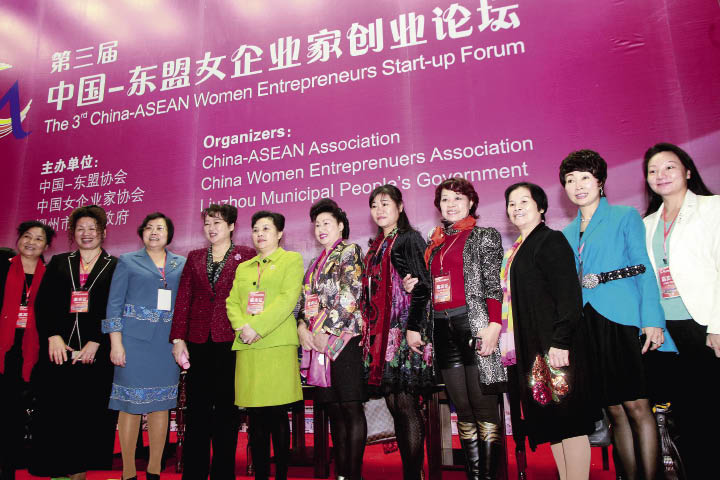Women Hold up Half the Sky
By staff reporter LI YUAN
 |
| Women entrepreneurs come together at the Third China-ASEAN Women Entrepreneurs Start-up Forum in Liuzhou, Guangxi last November. The power of women grows in business, but the gender gap is so large that women need to meet more challenges. |
LAST October, the Geneva-headquartered World Economic Forum (WEF) released the Global Gender Gap Report 2012, in which Iceland ranks first for the fourth consecutive time. China came just past midway down the list, taking 69th place, higher than Japan, South Korea and other East Asian countries.
Introduced in 2006, the index measures national gender gaps using 14 indicators such as access to resources and opportunities, life expectancy, maternal mortality rate and the number of women in government. It covers 135 countries involving 93 percent of the world population.
Along with increasing social status, access to education, and disposable income, the female multitude in China has been rising to become a force to be reckoned with. This force is growing from women themselves as well as the integration and reciprocation between women and men. “She” power is changing the social status of Chinese women.
Increasing Social Status
“Less than a century ago, many Chinese women had their feet broken and bound so tightly they could scarcely walk,” wrote Patti Walder in her article in the Financial Times. When the article was published back in 2010, the world’s three richest self-made women were from China, and 11 out of 20 female billionaires were Chinese.
Indeed, the lives of women changed dramatically in just three generations. This can be seen in the story of talk show host and female activist Yang Lan’s family, whose various women were at the forefront of change. Her maternal grandmother was born after the 1911 Revolution, which put an end to dynastic China and ushered in democratic thoughts. She fortunately escaped the fate of bound feet, which was outlawed by the Republic of China, as well as arranged marriage, and instead went to Shanghai to support herself by working in a factory and she married the man she loved.
Following the founding of the People’s Republic of China, women were encouraged to compete with men in all fields including academics. Yang’s mother became the first female college graduate in the family, who saved every dime to support her going to school, which would have been unthinkable in a family with five children during a previous time.
It was during a job interview in 1990 that Yang Lan first felt the pressure of gender stereotyping. The TV producer told her the program wanted a beautiful and well-behaved female host, innocent and a little bit naive. Why can’t a female host have her own point of view and style? Yang, a recent graduate from college, asked. She didn’t expect this to win her the role, but to her surprise the producer appreciated her freshness and cast her as the host.

